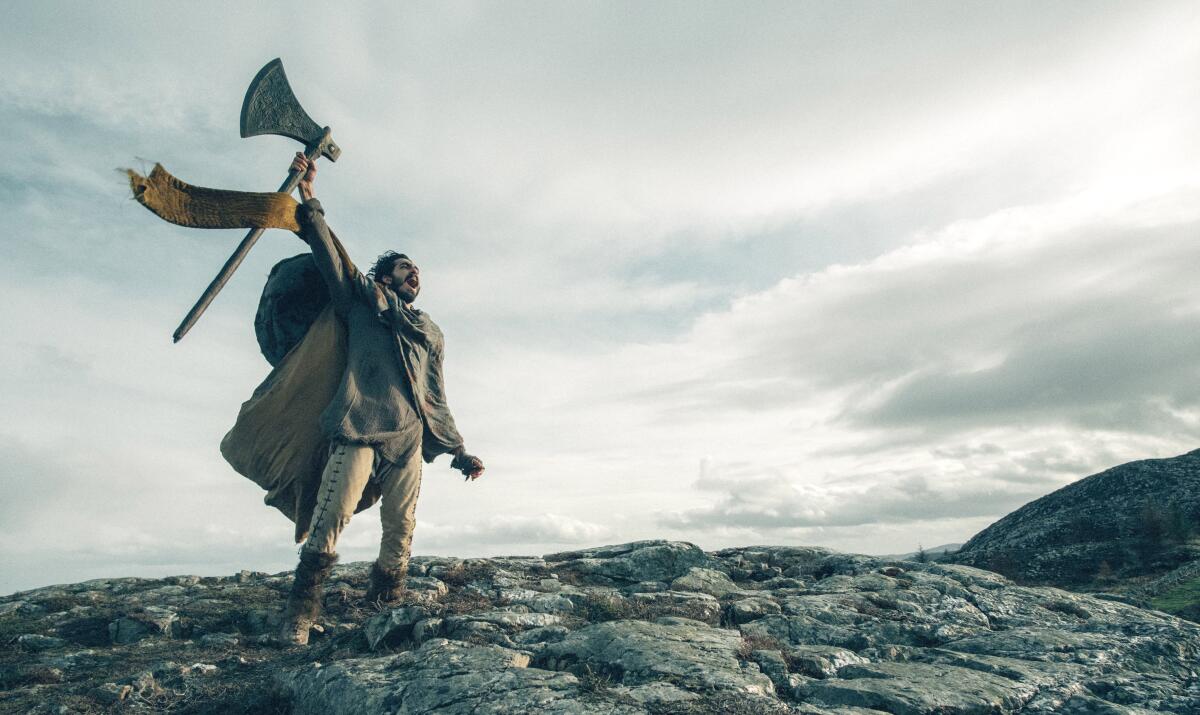Medieval ‘weirdness’ in the score taps into the otherworldly feel of ‘Green Knight’

- Share via
The one note David Lowery kept giving his composer, Daniel Hart, was: “Be weirder.”
Lowery’s film was already as weird as its source, the 14th century poem “Sir Gawain and the Green Knight.” Starring Dev Patel as the laddish Gawain, “The Green Knight” is an art-house take on a medieval epic, a psychological character study where bawdy humor and sensuality and horror commingle, and where magical creatures and wizardry are conjured by both old-school trickery and modern CGI.
It’s a twisted meditation on fate and death from the same director who put Casey Affleck under a bedsheet to wander for eternity in “A Ghost Story.”
Hart, who provided the haunting adagios for that 2017 film and has been working with Lowery since 2005, was born to tackle the enchanted world of Sir Gawain. His parents are both musicians in the Episcopalian church, and he grew up surrounded by music with roots in medieval England, so this score is “a real representation of a huge chunk of my relationship to music as a child,” Hart said.
“‘Ghost Story’ felt very personal to me, but this one probably even a bit more than that.”
Gawain is first introduced waking up on Christmas, hungover in a brothel, uttering one of the most risque deliveries of the phrase “Christ is born, indeed.”
“I thought my parents would really enjoy that,” said Hart. “They said when they were in grad school for church music, they heard the dirtiest jokes they’ve ever heard in their lives.”
Hart introduces a jagged, mischievous theme for the movie’s title character in that scene which, performed on childlike recorders, captures his immaturity. The score often comments on Gawain from an authorial perspective, rather than emanating from within him. When he encounters a bevy of female giants, for instance, the music acknowledges their awesome beauty instead of Gawain’s terror.
“The score is appreciating what’s on screen in a way that Gawain is not,” said Lowery, “and it is understanding what is happening, and reflecting what is happening, in a way that Gawain is too shortsighted to see.”
The theme for Gawain and Essel (Alicia Vikander) reflects the fact that, at least in the film’s climactic montage, their love isn’t enough for the boy who would be king.
“There’s definitely an inherent sadness in their love, and I think unconsciously so in their theme,” said Hart. “Optimistic melancholy is my default, so it’s not a stretch for me to write a sad love song. But it’s definitely the crux of what their relationship is up to that point in the film.”
In the long, nearly wordless montage, Hart’s score blossoms from a lonely fiddle tune into a rampant, rapidly growing forest of chorus and orchestra as Gawain’s bleak projection of what lies ahead if he chooses the path of a coward unfolds.
Stylistically, the music feels of the time and the soil that the story grows from. “It has an earthiness to it that sounds like wood and metal and stone all just being scraped against each other” — which was something that took trial and error to discover, Lowery said.
“One of the very early pieces Daniel tried had a much more electronic feel,” the director added. “It was beautiful, and at one point I almost revisited it. But it was too electronic. And that degree of anachronism just ran afoul of the film.”
As usual on Lowery’s films, Hart began working at the script stage, in the summer of 2018. What was highly unusual, of course, was the pandemic that delayed the film’s release by a full year, during which Lowery significantly recut the film.
Hart ended up re-scoring it multiple times. Whole scenes were dropped or re-edited as montages, necessitating new music. There were sequences Hart had scored with an orchestra that Lowery, in lockdown, decided would be better served by songs. So Hart wrote — and sang — original songs, including a Christmas carol and a lonely folk ballad that plays over a pivotal scene where Gawain rides home from his quest.
The composer’s journey was therefore, aptly, very weird. But that suited the music Hart was composing for a quartet of recorders, nyckelharpa — a medieval Swedish instrument — and a female choir singing alternately in Latin or made-up words. He recorded the choir, recorders and a cello ensemble in London last January.
The dominant sound on the “Green Knight” score, though, is Hart himself. A professional violinist, singer and general tinkerer, Hart typically layers his own personal style of playing into a full string ensemble. He also performed the contrabass recorder and the Paetzold, a blocky wooden recorder, as well as synthesizers and a custom-made hybrid wooden instrument — the Apprehension Engine — originally designed by a Canadian luthier for the film “The Witch.”
“It’s really part of my giving of myself to these scores, to this music,” said Hart. “I have things that I want to say as a composer, but I also have things that I want to say as a musician. And, you know, I could hire a string section to do it, and I could ask them to play like they’re whispering. But it means something more to me when I do it myself.”
More to Read
From the Oscars to the Emmys.
Get the Envelope newsletter for exclusive awards season coverage, behind-the-scenes stories from the Envelope podcast and columnist Glenn Whipp’s must-read analysis.
You may occasionally receive promotional content from the Los Angeles Times.






